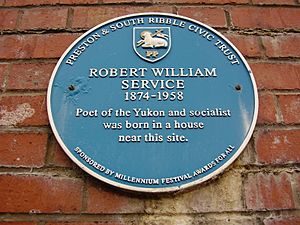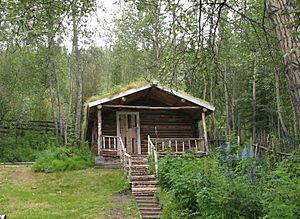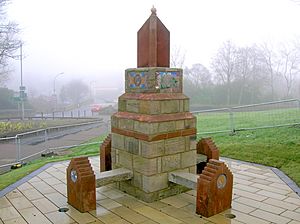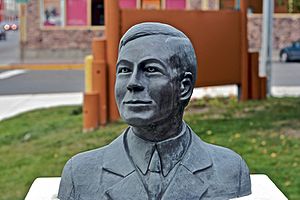Robert W. Service facts for kids
Quick facts for kids
Robert Service
|
|
|---|---|
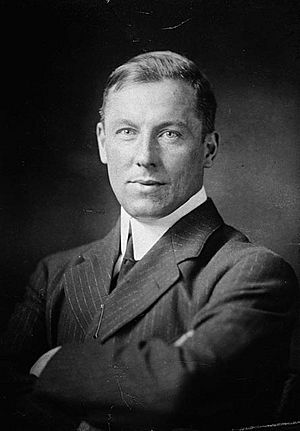
Service c. 1905
|
|
| Born | January 16, 1874 Preston, Lancashire, England |
| Died | September 11, 1958 (aged 84) Lancieux, Côtes-d'Armor, France |
| Resting place | Lancieux, Côtes-d'Armor |
| Occupation | Writer, poet, Canadian Great North adventurer |
| Alma mater | University of Glasgow, and McGill University |
| Genre | Poetry, Novel |
| Notable works | Songs of a Sourdough, Rhymes of a Red Cross Man, The Trail of '98 |
| Spouse | Germaine Bourgoin |
| Children | 1 |
Robert William Service (born January 16, 1874 – died September 11, 1958) was a famous British-Canadian poet and writer. People often called him "the Bard of the Yukon" because of his poems about the Canadian North.
He was born in England, but his family was from Scotland. Robert Service worked as a bank clerk for a while. However, he spent a lot of time traveling in the Western United States and Canada. He was often quite poor during these travels.
When his bank sent him to the Yukon, he heard many exciting stories about the Klondike Gold Rush. These stories inspired him to write two poems: "The Shooting of Dan McGrew" and "The Cremation of Sam McGee". Even though he had never been a gold miner, his poems felt very real. People loved them right away!
Because his first poems were so popular, he quickly wrote more on the same topic. These were published in a book called Songs of a Sourdough. This book sold a huge number of copies. His next collection, Ballads of a Cheechako, was also very successful. Thanks to his writing, Service became wealthy. He could then travel widely and live a relaxed life, mostly in Paris and the French Riviera.
Some critics didn't think his work was "serious poetry" because it was so popular and he wrote it quickly. They sometimes compared him to Rudyard Kipling. But Robert Service didn't mind. He was happy to call his work "verse, not poetry."
Contents
Robert Service's Life Story
Growing Up and Early Adventures
Robert Service was born in Preston, Lancashire, England. He was the third of ten children. His father, also named Robert Service, was a banker from Kilwinning, Scotland.
When Robert was five, he went to live in Kilwinning with his three aunts and his grandfather. His grandfather was the town's postmaster. It's said that Robert wrote his first poem, a short prayer, on his sixth birthday there.
At age nine, Robert moved back with his parents, who were now living in Glasgow. He went to Hillhead High School in Glasgow.
After school, Service started working at the Commercial Bank of Scotland. He was already writing and selling his poems. He also enjoyed reading poetry by famous writers like Robert Browning, John Keats, and Alfred, Lord Tennyson.
When he was 21, Service traveled to Vancouver Island, British Columbia. He dreamed of becoming a cowboy. He moved around western North America, from California to British Columbia. He took many different jobs and often relied on the kindness of Scottish friends and family who had moved to Canada.
In 1899, Service was a store clerk in Cowichan Bay, British Columbia. He told a customer that he wrote poems. This led to six of his poems about the Boer War being published in a newspaper by July 1900. One of these was "The March of the Dead".
During this time, Service fell in love with a woman named Constance MacLean. He tried to impress her by taking courses at McGill University's Victoria College, but he didn't pass.
In 1903, Service got a job at a Canadian Bank of Commerce branch in Victoria. The bank later sent him to Kamloops and then, in 1904, to their Whitehorse branch in the Yukon. He continued writing and saving his poems. More than a third of the poems in his first book were written before he moved north.
Life in the Yukon
Whitehorse was a new town, less than ten years old. It was a stopping point for gold seekers on their way to Dawson City during the Klondike Gold Rush. The railroad Service took to get there had only been built in 1900.
Service settled in Whitehorse and listened to the exciting stories of the gold rush. He also enjoyed the town's active social life. He would recite poems at concerts, but people were getting tired of the old ones.
One day, the editor of the Whitehorse Star newspaper suggested he write a new poem about the Yukon. Service later said that one Saturday night, he heard sounds from a saloon. The line "A bunch of the boys were whooping it up" came to his mind. He rushed to the bank to write it down, almost getting shot by a guard who thought he was a burglar! By the next morning, "The Shooting of Dan McGrew" was finished.
A month later, he heard a story about a miner who cremated his friend. He spent the night walking in the woods, creating "The Cremation of Sam McGee". He wrote it down the next day.
Other poems quickly followed. He wrote about things he hadn't even seen, based on conversations with locals. He didn't visit Dawson City until 1908, long after the Gold Rush.
Service gathered enough poems for a book. He sent them to his father in Toronto, hoping to print a small booklet to give to friends. But the publisher's employees loved the poems. They offered him a contract and sent back his money.
Service's book, Songs of a Sourdough, was a huge success. It was also called The Spell of the Yukon and Other Verses in the United States. It was printed many times even before its official release. Service earned a lot of money from this book alone.
In 1908, after three years with the bank in Whitehorse, Service took a mandatory paid leave. He went to Vancouver and saw Constance MacLean again. Now that he was a successful author, she agreed to marry him.
After his leave, the bank moved Service to Dawson. There, he met many people who had been part of the Gold Rush. He listened to their stories and used them to write his second book of poems, Ballads of a Cheechako, in 1908. This book was also very popular.
In 1909, Service decided to quit his bank job. He rented a small cabin in Dawson City and became a full-time writer. He worked on his first novel, The Trail of '98, which he finished in five months. This novel also became a best-seller.
Now wealthy, Service traveled to Paris, the French Riviera, and Hollywood. He returned to Dawson City in 1912 to write his third poetry book, Rhymes of a Rolling Stone. It's not clear what happened between Service and Constance MacLean, but she married someone else in 1912.
Later Years and World Wars
Service left Dawson City for good in 1912. From 1912 to 1913, he worked as a reporter for the Toronto Star during the Balkan Wars.
In 1913, Service moved to Paris, France, and stayed there for 15 years. He married Germaine Bourgoin in June 1913. She was 13 years younger than him. They bought a summer home in Lancieux, France.
When World War I started, Service was 40. He tried to join the army but was turned down. He briefly reported on the war for the Toronto Star. Later, he worked as a stretcher bearer and ambulance driver for the American Red Cross. He wrote a book of war poems, Rhymes of a Red Cross Man, in 1916. This book was dedicated to his brother, Albert, who died in the war. Robert Service received three medals for his service.
After the war, Service lived a rich life in Paris. He would dress nicely during the day and visit the city's less fancy places at night. He used these experiences in his next poetry book, Ballads of a Bohemian (1921).
In the 1920s, Service started writing thriller novels. Two of his novels, The Poisoned Paradise and The Roughneck, were made into silent movies. He spent winters in Nice, where he met other famous writers like H. G. Wells and William Somerset Maugham.
In the 1930s, Service visited the USSR. He later wrote a funny poem making fun of Lenin's Tomb. Because of this, his poems were never translated into Russian in the USSR.
His second trip to the Soviet Union was cut short by news of the Molotov–Ribbentrop Pact. Service fled across Europe to Stockholm. He then went to Nice with his family before fleeing to Canada when the Nazis invaded France. The Nazis even came to his home in Lancieux looking for him because he had made fun of Adolf Hitler in his poems.
During World War II, Service lived in California. He visited U.S. Army camps to recite his poems and boost morale. He even played himself in the movie The Spoilers (1942), acting alongside Marlene Dietrich and John Wayne. He was very excited to be in a scene with Marlene Dietrich.
After the war, Service and his wife returned to their home in Brittany, France, and rebuilt it. He lived there until he died in 1958. He spent his winters in Monte Carlo. Service's wife and daughter visited the Yukon in 1946, but Service himself never went back. He preferred to remember Dawson City as it was.
Service wrote a lot in his final years. He wrote two books about his own life, Ploughman of the Moon (1945) and Harper of Heaven (1948). He also published six more poetry books between 1949 and 1955. He died in Lancieux and is buried there. A book he wrote in 1956 was published after his death.
In 1958, shortly before he died, Canadian broadcaster Pierre Berton recorded many interviews with Service. During these interviews, Service recited "The Shooting of Dan McGrew" and "The Cremation of Sam McGee".
Robert Service's Writing Style
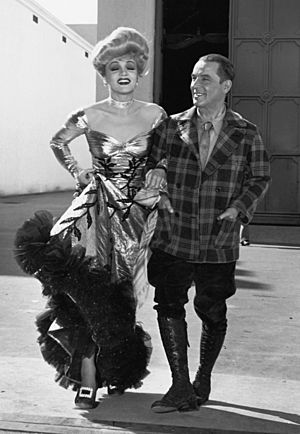
Robert Service wrote some of the most popular poetry of his time. However, many literary critics considered his most famous works to be "doggerel," meaning simple, light verse. During his life, he was called "the Canadian Rudyard Kipling."
Service himself didn't call his work "poetry." He said, "Verse, not poetry, is what I was after... something the man in the street would take notice of." He wanted his poems to be easy to understand and remember.
In his autobiography, Service described how he wrote in his Dawson City cabin. He would pin long rolls of paper on the wall and write his verses in large charcoal letters. Then he would walk back and forth, repeating them to make them perfect. He wanted them to sound good when read aloud.
He often wrote his most famous poems very easily. For "The Shooting of Dan McGrew," he said it "came so easy to me in my excited state." He felt like someone was whispering the words to him. The story seemed to create itself as he wrote.
Similarly, when he wrote "The Cremation of Sam McGee," the verses just flowed. He said, "verse after verse developed with scarce a check." He could write it down from memory the next day with little effort.
Some critics, like Archibald MacMechan, felt that Service's Yukon poems dealt with "squalid themes" and were too much like Kipling's style. However, MacMechan did admit that Service's World War I poetry, like Rhymes of a Red Cross Man, was better. He felt that Service's simple style worked well with the serious subject of war.
Honors and Recognition
Robert W. Service has been honored in many ways. Several schools are named after him, including Robert Service High School in Anchorage, Alaska, and Robert Service School in Dawson City.
He was featured on a Canadian postage stamp in 1976. A main road in Whitehorse, Robert Service Way, is also named after him.
The Bard & Banker pub in Victoria is dedicated to him. This building used to be a bank branch where Service once worked.
Service's first novel, The Trail of '98, was made into a movie by Metro-Goldwyn-Mayer in 1929. The film, also called The Trail of '98, was praised for showing the Klondike Gold Rush as it really was.
In 1968, country singer Hank Snow recorded an album called Tales of the Yukon, where he recited eight of Service's longer poems. Folksinger Country Joe McDonald also set some of Service's war poems to music for his 1971 album, War War War.
The Canadian whiskey Yukon Jack used parts of his writings in their advertisements in the 1970s.
The town of Lancieux, France, where Service spent his summers, has honored him. A street is named Robert Service Street. In 1990, a special plaque was unveiled by his daughter, Iris Service. In 2002, the school in Lancieux was named "École Robert W. Service." Since 2000, Lancieux and Whitehorse are sister cities because of Robert Service's connection to both places.
Radio host Jean Shepherd recorded a collection of Robert Service's poems. Also, actress Margaret Rutherford recited most of "The Shooting of Dan McGrew" in the 1964 film Murder Most Foul.
Robert Service's Cabin in Dawson City
From 1909 to 1912, Robert Service lived in a small two-room cabin in Dawson City. He rented it from Edna Clarke. He even had a telephone there, which was a luxury at the time. Service later decided he couldn't go back to Dawson because it wouldn't be the same as he remembered it.
After Service left for Europe, a group called the Imperial Order of the Daughters of the Empire (I.O.D.E.) took care of the cabin until 1971. Then, Parks Canada took over. They still maintain it as a tourist attraction today.
An actor named Tom Byrne started The Robert Service Show in the cabin's front yard in 1978. This show was very popular with summer visitors. Today, local entertainers dressed in old-fashioned costumes work for Parks Canada at the cabin. They share information about Service's life and recite his poems for visitors.
 In Spanish: Robert William Service para niños
In Spanish: Robert William Service para niños
 | William Lucy |
 | Charles Hayes |
 | Cleveland Robinson |


